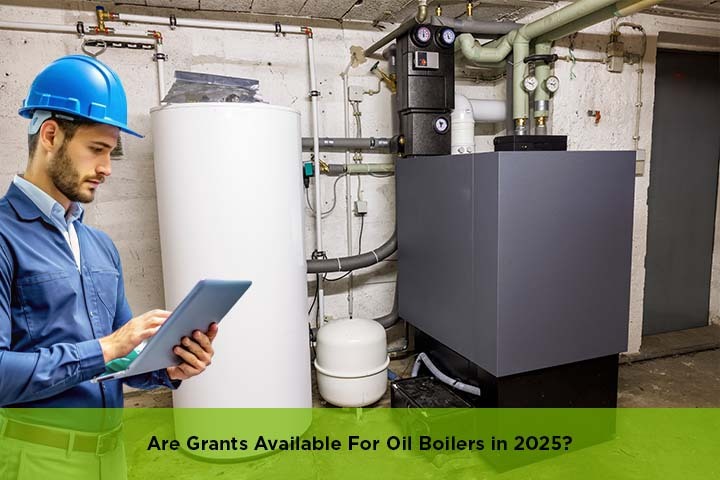In the UK, around 4.5 million homes aren’t connected to the mains gas grid. That is about 15% of all households. They get their heat from oil, LPG, or electricity. If that includes your home, you know that oil heating is expensive. And to top that, oil boilers are older, less efficient, and more damaging to the environment.
But the good news is that grants are available. With schemes backed by the government, such as ECO4 and the Boiler Upgrade Scheme, you could replace your old oil boiler with a cleaner, more efficient one. And you won’t have to pay a penny if you qualify for the grant.
The Future of Oil Boilers and Their Environmental Impact
Oil boilers have long been a popular option for off-mains homes. But with the UK aiming to meet its net-zero ambitions, the future of oil boilers is becoming increasingly uncertain.
Why Oil Boilers Are Falling Out of Favour
Oil boilers are fueled by kerosene, a fossil fuel heating. Combustion of the same releases carbon dioxide, a greenhouse gas that causes global warming. Actually, oil heating systems emit more CO₂ compared to most other residential heat systems.
That is why the government is urging people to shift away from oil boilers and switch to cleaner, greener alternatives.
Here’s the issue:
- High Carbon Emissions: Heating oil produces around 250 grams of CO₂ per kilowatt hour of heat. That is more than with gas boilers.
- Costly and Unpredictable: The price of oil is volatile. It fluctuates upwards and downwards based on worldwide happenings, and this makes budgeting troublesome.
- Risk of Spills: Having a storage of heating oil at your location involves a continuous threat of spills or leaks that damage the environment and are extremely costly to clean.
What’s Next for Oil Boilers in the UK?
The UK government plans to phase out the installation of new oil boilers by 2035 in off-grid homes unless they use low-carbon fuels. This means if your current boiler breaks down in the next decade, your next system may have to meet stricter eco-standards.
Instead, more modern alternatives such as air source heat pumps are encouraged. They are more efficient and more environmentally friendly, and because grant schemes are not a costly option either.
Why Replace Your Oil Boiler Today?
If your house still has an oil boiler, you are probably asking yourself—why change it? It still functions, correct? But the truth is this: oil boilers will warm your home, but there are a multitude of factors against them that a lot of people don’t know until too late.
1. Oil is Expensive—and Unpredictable
Oil prices fluctuate all the time. One month, it’s reasonable, and the next, it’s sky-high. As you’re taking delivery of fuel in bulk, a single shipment is going to cost several hundred pounds. And in the winter, when there is more demand, it will cost even more.
2. Older Boilers Are Less Efficient
Most UK household oil boilers are more than 10–15 years old. This is something of an issue since older systems squander more fuel to generate the same level of heat. The older systems tend to burn oil inefficiently and lose a considerable amount of heat via the flue or pipes.
3. Maintenance and Repairs Are Not Cheap
Oil boilers tend to get clogged, break down, or leak more than newer systems. Additionally, oil boilers require servicing every year to maintain them safely and effectively. The cost of that builds over time.
4. Future Regulations Are Getting Strict
The UK government has made it plain: oil-heating systems such as oil boilers are to be phased out. You won’t be able to fit a new oil boiler after 2035, and only if it complies with very strict emissions regulations.
And if new legislation happens earlier, keeping your current system running will cost more money—and in some cases, will be prohibited.
Can I Get a Grant to Replace My Oil Boiler?
Yes, you can. If your property is oil-heated, there are two principal schemes offered by the government that can help in a change to a more eco-friendly heating system:
1. ECO4 Scheme (Energy Company Obligation)
The ECO4 initiative is a scheme by the government that supports low-income and vulnerable households to make their homes more energy efficient. It runs until March 2026.
What can it cover?
- Air source heat pumps (to replace your oil boiler)
- Free insulation (walls, loft, etc.)
- Additional energy-saving measures
Who qualifies?
You may qualify if:
- Your property is off the gas grid
- You use oil for heating.
- You or a member of your household is getting qualifying benefits (such as Universal Credit, Income Support, etc.)
- Your house has a poor Energy Performance Certificate (EPC) rating (E, F, or G)
2. Boiler Upgrade Scheme (BUS)
The Boiler Upgrade Scheme will provide grants to offset the cost of replacing fossil fuel-based heating systems with lower-carbon alternatives.
Who qualifies?
- Homeowners in England and Wales.
- Properties off the gas grid.
- Households replacing a current fossil fuel system (such as oil, gas, or LPG)
- Properties with a valid EPC have no outstanding suggestions to insulate the loft or cavity walls.
What can you get?
- £7,500 to help towards the cost of fitting an air source or ground source heat pump.
- £5,000 towards a biomass boiler, where your property is located in a rural area and not connected to the gas network.
Comparing ECO4 and the Boiler Upgrade Scheme
Both ECO4 and BUS aim to promote energy efficiency, but they cater to different audiences and offer varying benefits.
| Feature | ECO4 Scheme | Boiler Upgrade Scheme (BUS) |
|---|---|---|
| Target Audience | Low-income households all over the UK | Homeowners in England and Wales |
| Primary Focus | Replacing inefficient boilers and insulation | Installing low-carbon heating systems |
| Grant Coverage | Potentially full-cost coverage | Up to £7,500 for heat pumps |
| Eligibility Criteria | Based on income and benefits | Property must have a valid EPC |
| Additional Benefits | May include other energy-saving measures | Focuses on heat pump installation |
Who Can Get a Free Oil Boiler Replacement Grant?
Here is the eligibility criteria for the oil boiler grant:
- Homeowners and private tenants in England, Scotland, or Wales.
- You or a resident in your household receives one of the benefits below:
- Income Support
- Jobseeker’s Allowance (JSA)
- Employment and Support Allowance (ESA)
- Universal Credit
- Working Tax Credit or Child Tax Credit
- Pension Credit (Guarantee or Savings Credit)
- Housing Benefit
- Your home has an Energy Performance Certificate (EPC) rating of E, F, or G, indicating lower energy efficiency.
Benefits of Replacing Your Oil Boiler with a Heat Pump
Switching to an air source heat pump (ASHP) from an oil boiler can have significant benefits— both for your wallet and the planet.
Huge boost in efficiency
Oil boilers are generally at a level of 85% efficiency. This means 15% of the fuel is wasted. However, modern heat pumps are 300% to 400% efficient. This means that three to four units of heat are produced by every unit of electricity consumed.
Reduced energy bills
Since they operate with less power to generate heat, you should notice a visible reduction in your bills to heat your home. Mainly, if your current source of heat is costly fuels such as oil or LPG.
Government grants cover the cost
Through schemes such as ECO4 and the Boiler Upgrade Scheme, you could have an air source heat pump fitted free or with a sizeable subsidy. ECO4 assists low-income households in having inefficient old heating systems replaced at no cost.
Reduce your carbon footprint
Oil burners use fossil fuels and emit CO₂. A typical household with oil heating produces a lot of tonnes of carbon dioxide annually. Electricity can power air source heat pumps, and if the power source is renewable, such as solar or wind power, they are much cleaner.
Future-proofing your home
The UK will be phasing out the use of fossil fuels to heat homes by 2035. Replacing your oil boiler with a lower carbon alternative now gets you ahead of the curve and avoids the rush—and rising costs—later.
How to Apply for Your Oil Boiler Replacement?
The process is generally simple:
- Check if you qualify: You can either use online calculators or talk to a local ECO installer.
- Get a free survey: A surveyor will come to your property to inspect your current system and EPC rating.
- Get approved: If your situation and home are eligible, your application will be considered.
- Installation: A trained and authorized installer will be sent to fit the new system – usually within several weeks.
The Bottom Line
Replacing your old oil boiler with a new, energy-efficient system such as an air source heat pump will save you money and help reduce your carbon emissions.
With the help of schemes such as ECO4 and the Boiler Upgrade Scheme, UK homeowners and tenants eligible under the current criteria can obtain full-fledged grants to make this upgrade.
If you are off the gas grid and are eligible, now is a good time to make the switch to cleaner, greener heat and have a warmer, more affordable home.
Frequently Asked Questions (FAQs)
Yes. If you are eligible under the ECO4 scheme, you can have a free heat pump installed to replace an old oil boiler. You may be eligible to get a grant under the Boiler Upgrade Scheme in England or Wales.
No, the UK government no longer gives people grants to have new oil boilers installed. Instead, under schemes such as ECO4 and the Boiler Upgrade Scheme, you can have assistance to replace your old oil boiler with a more efficient system.
You could be eligible to get a free replacement, but not an oil boiler. Low-income or off-mains homes are encouraged by the ECO4 initiative to upgrade to low-carbon heat—typically a heat pump.
The best alternative is an air source heat pump. It is much more efficient – up to 300–400% – and produces far less carbon.








